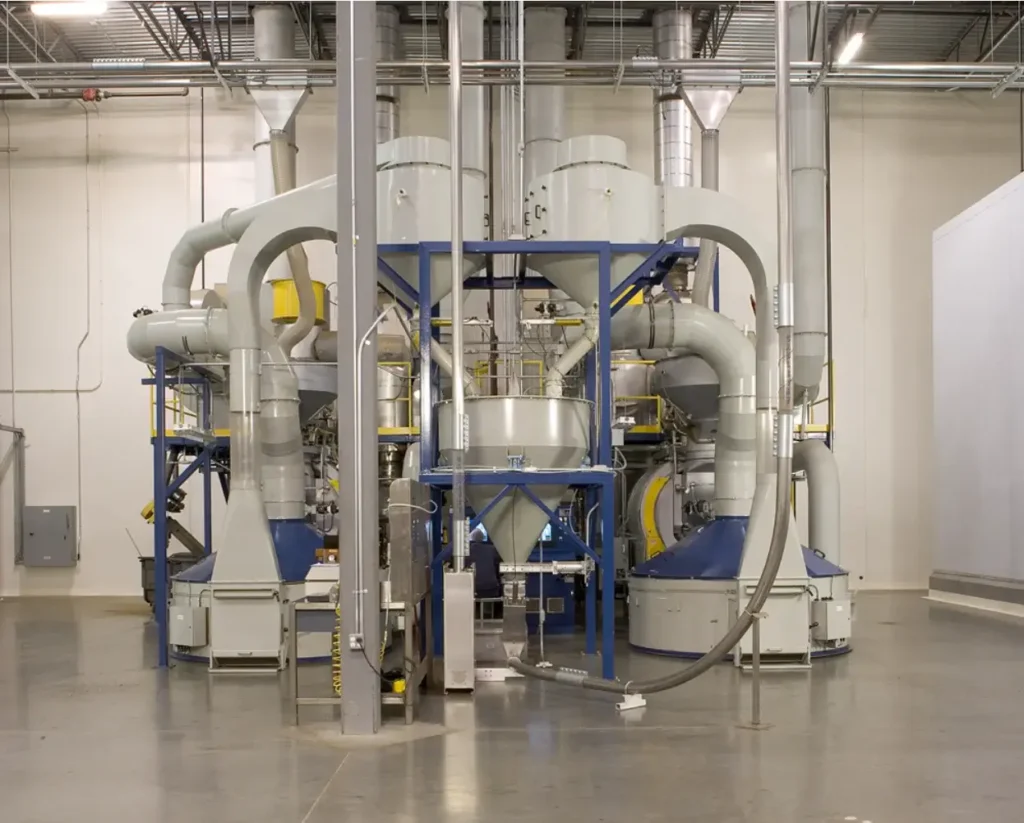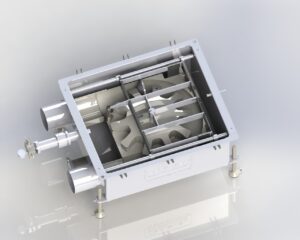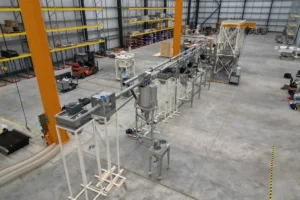Conveyor systems in food processing play a crucial role in the efficient movement of materials. Given the many factors that need to be taken into consideration, choosing the best conveyor technologies for food processing is a complex task. But what to look for in a food conveyor for your business? In this article, we will provide a comprehensive guide on this topic, covering important aspects such as sanitation, efficiency, maintenance, and safety.
Wondering What to Look for in a Food Conveyor for Your Business? Let’s Explore All the Crucial Factors
When it comes to the food processing industry, one of the most vital aspects of production is conveying. In order to successfully convey materials, especially fragile materials, you need quality conveyor systems. But the question is – how does a manufacturer know what kind of conveyor technologies their business requires?
We’ve explained all the important factors that should be taken into account when choosing conveyor solutions for your business. Understanding them allows you to choose the best system and ensure production runs smoothly and efficiently.
#1 Sanitation and Cleanliness of the Conveyor
According to our State of Conveying report, cleaning, and maintenance represent one of the top 3 greatest challenges when conveying materials in 54% of food processing facilities. However, food safety regulations and guidelines must be adhered to in order to ensure your products are safe for consumption. The potential for foodborne illnesses can have severe consequences, both for consumers and the reputation of the facility and its products.
The materials and construction of the conveyor should promote easy cleaning, prevent contamination, and should be durable enough to withstand frequent cleaning. Stainless steel is a material that’s commonly used for making food conveyors due to its durability, resistance to corrosion, and ease of cleaning. You should also know that it’s important to look for conveyor systems with sealed bearings and other components that prevent any food contamination or bacteria build-up.
Is it hard to find a system that can live up to your expectations when it comes to sanitation? Not at all – in fact, Cablevey Conveyors can offer you outstanding conveyor solutions that are made with food-grade materials. They are easy to clean, and their closed tubular conveying system eliminates the spaces and crevices that can harbor bacteria.
#2 The System’s Capacity and Efficiency
In order to optimize production, you’ll need to choose industrial conveyor systems that can handle the necessary volume of ingredients or finished products. This means taking into account factors such as the weight and volume of the materials (or bulk density), as well as the speed at which they need to be moved. Adjustable speeds and inclines can help improve efficiency, allowing you to optimize the flow of materials based on your specific needs.
It’s recommended to consider if the conveyor can handle any variations in the size, shape, or weight of the products being transported. When choosing an adequate conveyor, you must have an understanding of the production process so you can choose a material handling system that will match the requirements of that process. As you may have guessed, Cablevey Conveyors offers conveyor engineering with variable speed drives, which gives manufacturers the possibility to adjust the flow rate.
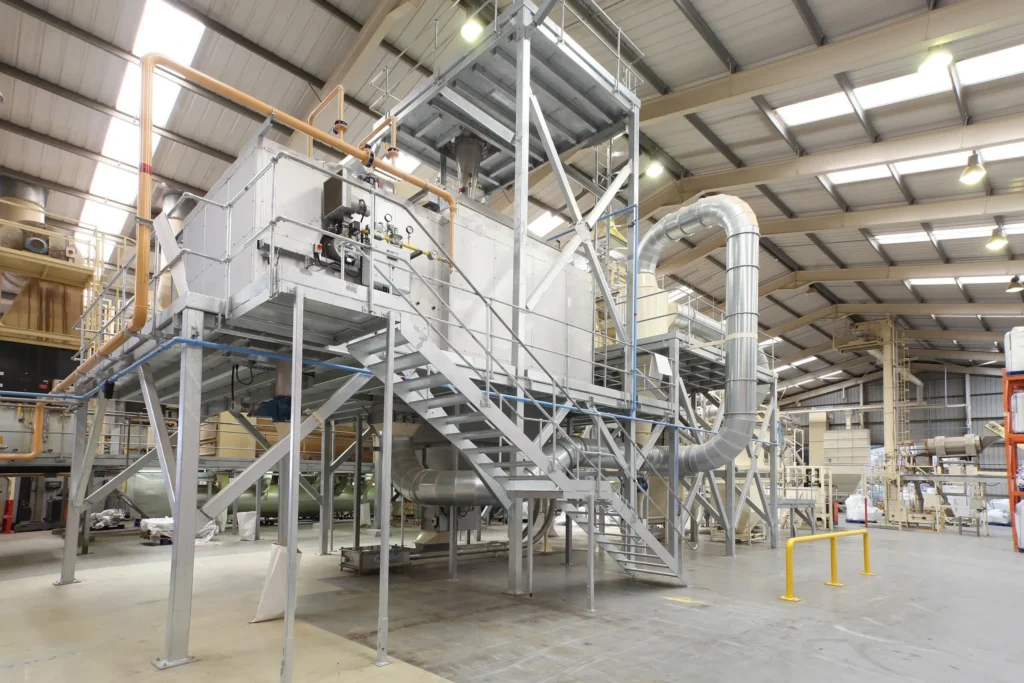
#3 Plans for Future Expansion of Your Business
When considering the capacity and efficiency of a food conveyor system, it’s important to not just look at the current needs of your facility but also to consider the potential future capacity of the facility. This means taking into account the potential for growth and expansion in the future and choosing a conveyor system that can accommodate that growth. For example, if you anticipate an increase in production volume in the near future, you’ll want to choose a conveyor system that has the capacity to handle that increased volume.
This may mean choosing a system with a larger capacity than you currently need or one that can be easily expanded or modified. It’s also important to consider the scalability of the conveyor system and if it can be integrated with other equipment. The point is to avoid having to replace the whole system in case of future upgrades or expansion. Additionally, you should consider the flow rate, the conveyor’s speed, and whether your conveyor can handle a speed that suits the future production flow rate.
#4 Durability and Maintenance
Food processing is a fast-paced environment, and your conveyor will need to be able to withstand the demands of constant use. When it comes to the durability and maintenance of a food conveyor, there are several factors to consider:
- Materials and construction – Choosing a system that is made with high-quality materials and solid construction can help to ensure that the system is durable. Conveyors made from stainless steel are known for their resistance to corrosion and ability to withstand frequent cleaning. Additionally, consider the quality of the components of the conveyor, like bearings, pulleys, chains, and belts.
- Maintenance requirements – Consider how easy the conveyor is to maintain, not just for daily cleaning but also for regular maintenance and repairs. Look for conveyors that have easy-to-access components and features, such as sealed bearings, that can be easily replaced. It’s also a good idea to research the availability of spare parts and maintenance services for the conveyor system you are considering.
- Longevity of the system – Consider the lifetime cost of a conveyor by researching the conveyor’s warranty and estimated lifetime. It may be more cost-effective in the long run to invest in a higher-priced conveyor with a longer lifespan rather than a cheaper one that may need to be replaced more frequently.
It bears mentioning that Cablevey Conveyors offers top-quality systems that are engineered with high-grade materials and components that ensure longevity. We also offer maintenance programs, conveyor installation supervision, and repair services to keep your conveyor running at peak performance.
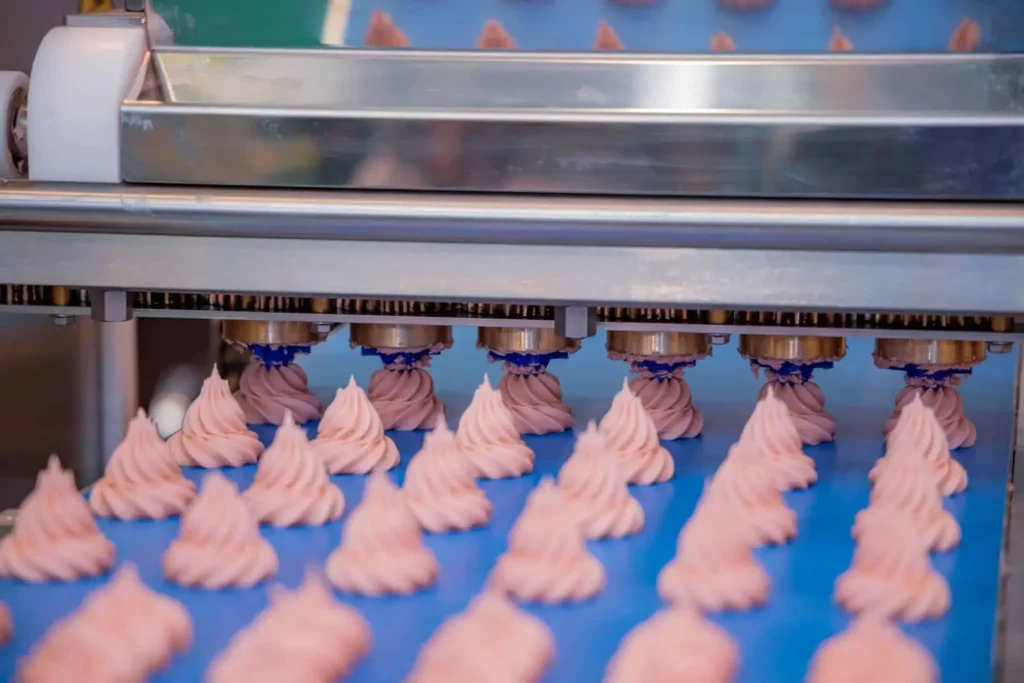
#5 Customization and Integration of the Conveyor System
It’s important to choose a conveyor system that can be customized to fit the specific needs and layout of your production facility. This may include the size and shape of the conveyor, the location and height of the conveyor, the speed and flow rate of the conveyor, and any other special features or requirements that may be unique to your facility. Customization can help ensure that the conveyor is a good fit for your facility and can help optimize the efficiency and flow of materials.
Tips for Choosing a Customized Conveyor That Will Suit Your Needs Perfectly
You’ll want to choose conveyor systems that can seamlessly integrate with other equipment and processes in your facility. This means considering how the conveyor will integrate with other equipment and interface with existing processes and systems. For example, if the conveyor will be used in conjunction with packaging or sorting machines, it’s important to make sure that the conveyor can easily integrate with that equipment and that the flow of materials between the conveyor and other equipment is smooth and efficient.
Consider the different types of conveyors available and the advantages and disadvantages of each type. This may include belt conveyors, roller conveyors, chain conveyors, or flexible conveyors, and each may be more suitable depending on the specific needs of your facility. It’s important to consider the overall layout of the facility and the flow of materials within the facility.
It would be wise to make sure that the conveyor is located in the most efficient location possible. To achieve that, you also need to figure out which shape of a conveyor would fit best into your facility. Do you need a horizontal or vertical conveyor? Or maybe an overhead one? These are all questions you need to answer before you start conveyor shopping.
#6 The Price of a Conveyor System and Your Budget
Determining your budget and comparing the costs of different industrial conveyor systems can help you make an informed decision. However, it’s also important to keep in mind long-term cost considerations such as maintenance and energy efficiency. It’s also important to consider the cost of conveyor installation and any necessary modifications to your facility in order to accommodate the system.
Cablevey Conveyor is one of the companies dedicated to creating systems that are built with energy efficiency in mind and have a low energy consumption. Our goal is to help you save on energy costs in the long run. We strongly recommend that every client considers the cost-benefit analysis of the conveyor, both in terms of the initial investment and the long-term savings it can bring to the production process.
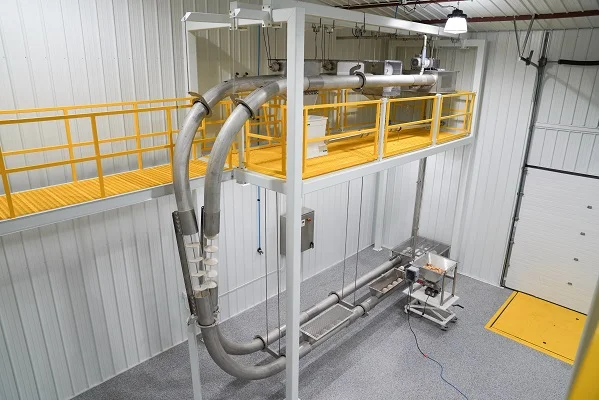
#7 Safety and Ergonomics
Conveyor systems should be designed with safety in mind, so it’s important to look for features such as emergency stop buttons and automatic shut-off in case of a jam or other malfunction. In addition, ergonomics is crucial for the safety of operators, who may need to work around or near the conveyor. The conveyor should be designed to minimize the risk of injury to operators and be easy to access for maintenance and repairs.
Contact Cablevey Conveyors for the Most Efficient Conveyor Technologies on the Market
Choosing a food handling system is an important decision that will have a direct impact on the efficiency and productivity of your facility. It is important to conduct thorough research and do your due diligence to make an informed decision about the conveyor solutions you want to invest in.
Once you’re done with the research, you will undoubtedly figure out that Cablevey Conveyors is one of the top options on the market. We are well-known for our closed tube design for easy cleaning, adjustability for optimal flow rate, customization options, energy efficiency, and safety features. With our team by your side, you can be confident that your investment will pay off in the form of increased efficiency and productivity for your food processing facility. Contact us to learn more about our brilliant conveyor technologies!
FAQ
How Important Are Sanitation and Cleanliness in a Food Conveyor System?
Sanitation is crucial in food conveyors to ensure products are safe for consumption. Conveyors should be easy to clean, resistant to corrosion, and constructed to prevent contamination. Materials like stainless steel are often used for their durability and ease of cleaning. Systems with sealed bearings avoid bacteria build-up. Companies like Cablevey Conveyors offer food-grade, easily cleanable conveyors to meet stringent hygiene standards.
How Do I Ensure the Conveyor System Can Handle My Production Volume?
Choose a conveyor considering the volume and weight of materials it will handle. Adjustable speeds and inclines optimize material flow. Assess if the conveyor can manage variations in product size and shape. Cablevey’s engineering with variable speed drives allows flexibility in adjusting the flow rate, ensuring the conveyor meets specific production requirements effectively.
Should I Consider Future Business Expansion When Choosing a Conveyor System?
Yes, you should. Select a conveyor considering not just current but future capacity needs. Anticipate production volume increases and opt for systems that are expandable or modifiable. Assess the conveyor’s scalability and integration with other equipment to avoid complete replacements during upgrades. Ensure it can handle speeds that suit future production flow rates, ensuring a long-term solution.
What Factors Should I Consider Regarding the Durability and Maintenance of a Food Conveyor?
Consider the materials, construction quality, and maintenance requirements. Stainless steel conveyors are durable and resistant to corrosion. Easy-to-access components and the availability of spare parts facilitate maintenance. Assess the conveyor’s warranty and estimated lifetime to understand its long-term value. Companies like Cablevey Conveyors offer high-quality, long-lasting systems with maintenance and repair services ensuring peak performance.
How Do Customization and Integration Affect the Efficiency of a Conveyor System?
Customization ensures the conveyor fits your facility’s specific needs, optimizing efficiency. You need to evaluate how the system integrates with existing equipment and processes. Consider conveyor types and the facility’s layout to achieve optimal material flow. Assessing location, height, speed, and special requirements ensures the conveyor enhances overall productivity, making it a crucial aspect of the selection process.

